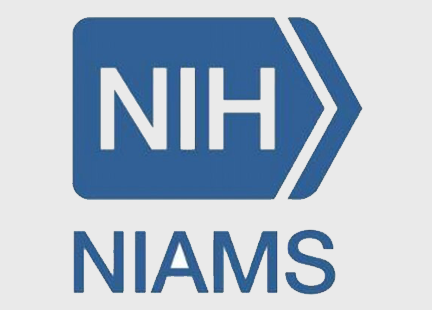
Spotlight on Research 2012
August 2012 (historical)
Scientists Identify Agent That Protects Against Organ-Damaging Fibrosis
A new study supported by the National Institute of Arthritis and Musculoskeletal and Skin Diseases (NIAMS), part of the National Institutes of Health (NIH), has identified a peptide that, in lab tests, protects against fibrosis. Fibrosis, a thickening of the skin and/or internal organs, is a potentially fatal characteristic of diseases including scleroderma and idiopathic pulmonary fibrosis.
The peptide, dubbed E4, is derived from endostatin, a component of the protein collagen XVIII. Endostatin has been studied as a cancer treatment because of its ability to prevent angiogenesis, or the formation of blood vessels, which enables cancers to grow and spread. NIAMS-supported scientists identified endostatin as a possible therapy for fibrosis based on earlier observations showing the protein was elevated in fibrosis; however, it was uncertain whether endostatin worsened or improved fibrosis, says investigator Carol A. Feghali-Bostwick, Ph.D of the Scleroderma Center at the University of Pittsburgh School of Medicine. When they tested it in human cells and human skin induced to become fibrotic, they found its effect was to improve fibrosis. This prompted them to look for the specific part of the endostatin fragment that was having the beneficial effect on fibrosis.
“We designed short peptides, stretches of amino acids, that matched or corresponded to different regions of endostatin to try to find out which region is really responsible for the reduction of fibrosis,” says Dr. Feghali-Bostwick. When they evaluated the peptide E4 in healthy human skin cells that were induced to become fibrotic, the skin remained normal. E4 also protected the skin and lungs of mice from thickening. In addition, the researchers found the peptide could reverse existing damage.
Fibrosis occurs when cells known as fibroblasts start making excess collagen, fibronectin and other proteins, leading to thickening of skin and hardening of organs, says Dr. Feghali-Bostwick. “Usually when that thickening occurs, particularly in internal organs, the organs cannot function properly and ultimately that’s what results in death.”
The eventual goal of the research, reported in the journal Science Translational Medicine, is the development of therapies that will prevent or reverse fibrosis and preserve organ function, she says. While such a therapy is likely still years away, the identification of E4, and its effectiveness in laboratory studies using human skin, is an important start.
The mission of the National Institute of Arthritis and Musculoskeletal and Skin Diseases (NIAMS), a part of the U.S. Department of Health and Human Services’ National Institutes of Health (NIH), is to support research into the causes, treatment, and prevention of arthritis and musculoskeletal and skin diseases; the training of basic and clinical scientists to carry out this research; and the dissemination of information on research progress in these diseases. For more information about the NIAMS, call the information clearinghouse at (301) 495-4484 or (877) 22-NIAMS (free call) or visit the NIAMS website at https://www.niams.nih.gov.
# # #
Yamaguchi Y, Takihara T, Chambers RA, Veraldi KL, Larregina AT, Feghali-Bostwick CA. A Peptide derived from endostatin ameliorates organ fibrosis. Sci Transl Med. 2012 May 30;4(136):136ra71.
